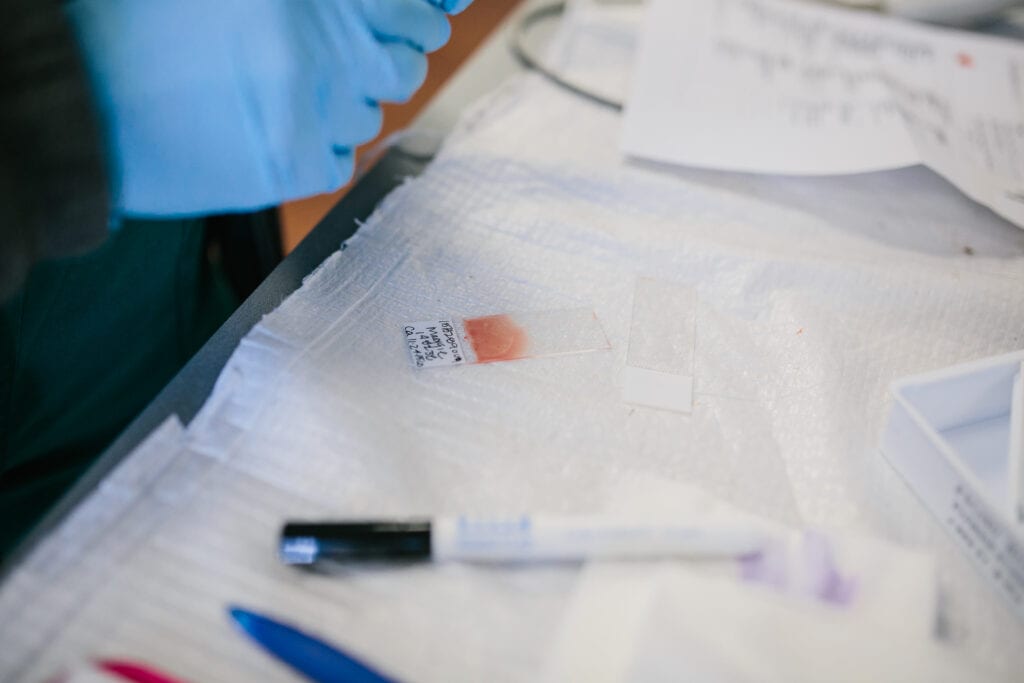Blood and Lab Work
 Blood and lab work helps us obtain a status of your pet’s health when they arrive at our hospital whether they are sick with a chronic condition or it’s an emergency situation. Sometimes it’s necessary for us to repeat bloodwork that was recently performed so that we can monitor the progress of your pet’s condition (if your pet is stable, improving or getting worse). We also monitor the trends in these results to help determine if we need to perform additional tests, or start, adjust or stop medications. Bloodwork may also be needed in the following situations:
Blood and lab work helps us obtain a status of your pet’s health when they arrive at our hospital whether they are sick with a chronic condition or it’s an emergency situation. Sometimes it’s necessary for us to repeat bloodwork that was recently performed so that we can monitor the progress of your pet’s condition (if your pet is stable, improving or getting worse). We also monitor the trends in these results to help determine if we need to perform additional tests, or start, adjust or stop medications. Bloodwork may also be needed in the following situations:
- Prior to anesthesia – This will allow our staff to know if the anesthetic protocol is safe for your pet and enables us to make adjustments if they see anything abnormal.
- Monitor medications – Periodic blood testing helps us monitor for potential side-effects of certain drugs and allows our veterinarians to make necessary changes on dosages or types of medication.
Common Blood Tests
Complete Blood Count (CBC)
A complete blood count (CBC) evaluates the cells that make up a patient’s blood. This includes red and white blood cells and platelets. A CBC is recommended as a part of every medical work up as it reveals critical information about your pet’s current health.
- Red blood cell count: This test evaluates for anemia (low red blood cell count), or polycythemia (high red blood cell count). Additional information about the red blood cells – mean corpuscular volume (MVC) which measures the average size of red blood cells and mean corpuscular hemoglobin concentration (MCHC) which measures the concentration of hemoglobin – the results can help determine the general cause of anemia. High red blood cell counts can be seen with dehydration and certain diseases.
- White blood cell count: This test evaluates for inflammation, infection, decreased ability to fight infection, stress or leukemia.
- Platelets: These blood cells help aid in forming clots and stop bleeding.
- Reticulocyte count: This may be ordered with a CBC to aid in determining if red blood cells are increasing in number in response to an anemia.
Blood Chemistry
A chemistry profile is a test to evaluate the chemical components in your pet’s blood stream. It will help us evaluate many major organs at one time or we may focus on just one organ by doing a smaller panel. Chemistry profiles are recommended as part of every medical work-up as it reveals critical information about a pet’s current health.
Renal Profile (Kidney): The kidney filters dangerous toxins, sodium and water from the blood stream to make urine. BUN (blood urea nitrogen), creatinine, phosphorus and calcium may all increase with kidney disease. Total protein, electrolytes (sodium, chloride, potassium and bicarbonate), cholesterol and glucose are also measured as they can be affected by kidney disease.
Kidney testing may indicate the following:
- Early renal disease
- Renal failure
- Infection
- Kidney or bladder stones
- Cancer
- Abnormalities caused by medication
Liver Profile: The liver removes bacteria and toxins from the blood and breaks down nutrients absorbed during digestion to be used by the rest of the body. Liver function tests measure the levels of certain enzymes and protein in the blood to help diagnose and monitor liver disease or damage.
Increased, elevated or higher-than-normal levels of the following could indicate liver damage or disease.
- Alanine transaminase (ALT) and aspartate transaminase (AST) are enzymes in the liver; when these are elevated, it indicates liver cell damage (the enzymes leak out of the cells)
- Alkaline phosphatase (ALP) is an enzyme in the liver which can be seen with bile duct obstruction.
- Bilirubin is produced during the normal breakdown of red blood cells.
Decreased or lower-than-normal levels of the following could be an indication of liver disease or injury.
- Albumin is a protein made by the liver that keeps blood components from leaking out of vessels.
- Total Protein (see below)
- Glucose, BUN and Cholesterol
Liver testing may indicate the following:
- Liver disease
- Cushing’s disease
- Dehydration
- Obstruction of bile ducts
- Some cancers
- Abnormalities caused by medication
Pre-surgical profile: This assessment checks liver and kidney functions with a single test prior to surgery to help find any problems that may complicate surgery if not found and treated early.
Electrolyte Panel (sodium, potassium, chloride): Increases can indicate dehydration, decreases can be seen with diarrhea and vomiting, as well as kidney disease. Electrolyte imbalances can also be seen with disturbances of the endocrine system (hormones). Calcium can increase with kidney disease, some cancers and toxicities, and parathyroid disease. Phosphorus can increase with kidney disease, and high phosphorus can be normal in young, growing animals.
Total Protein: Available by itself or within other profiles, this measures both albumin (increased with dehydration, decreased with blood loss, loss of liver function, and through gastrointestinal and kidney losses), and globulins (increased with inflammation, some infections and cancers, decreased with blood loss, gastrointestinal loss, and immunodeficiencies).
Amylase and Lipase: Increase in pancreatitis, but can increase with kidney and gastrointestinal disease, therefore these are not specific, and your doctor may require other tests, such as abdominal ultrasound.
Glucose: Can increase with excitement and stress, as well as diabetes mellitus (may be run with fructosamine, which assesses long-term control in diabetic patients). Low glucose can be seen with some diseases, cancers, and infections.
CK (Creatine Kinase): Increases with muscle damage, and AST may also increase with muscle damage.
Bile Acids: Increase with abnormal blood flow to the liver (shunts), decreased liver function, and possible bile duct obstruction.
Other Tests:
Urinalysis: This test can identify a urinary tract infection and crystals, but is also valuable in conjunction with chemistry tests to assess kidney function, hydration status and evaluate for metabolic disorders and other diseases. A urine protein: creatinine ratio may also be performed to let your doctor know if your pet is losing too much protein through its kidneys.
Coagulation tests: These tests measure the time it takes for a blood sample to form a clot, which can be elevated with certain diseases and toxicities, and can be run as a safety precaution prior to surgical or other procedures.
Thyroid tests: To assess for increased function (primarily cats), or decreased function (primarily dogs).
Cortisol: Using special test protocols to measure the level of this hormone produced by the adrenal gland can identify Addison’s disease (decreased), or Cushing’s disease (increased). If your pet is on medications for adrenal gland disease, this test is also used for monitoring treatment.
Blood Gas: Evaluates how well the lungs are functioning to provide oxygen to the rest of the body and remove carbon dioxide, and measures the pH (acidity) of the blood. Also measures ionized calcium, which can be increased with some cancers and toxicities, and kidney and parathyroid disease, and can be decreased with other parathyroid disease and low albumin. Some blood gas analyzers can also provide a few chemistry tests, and they evaluate for anemia.
